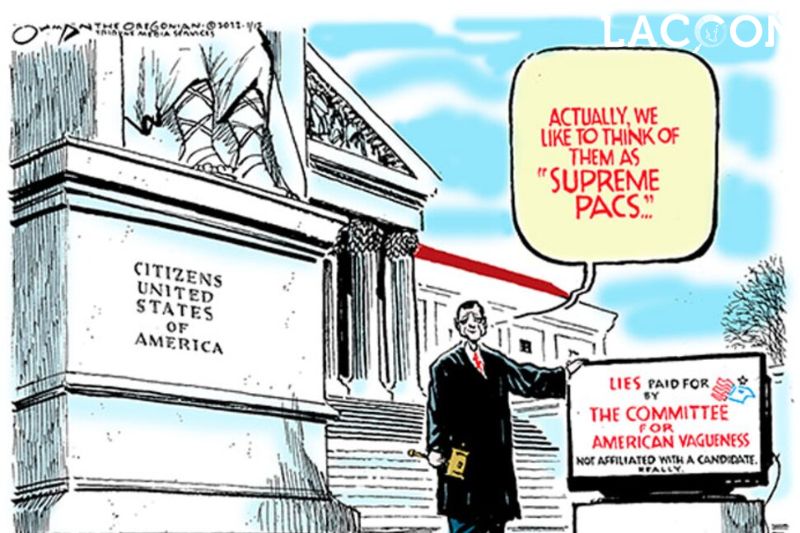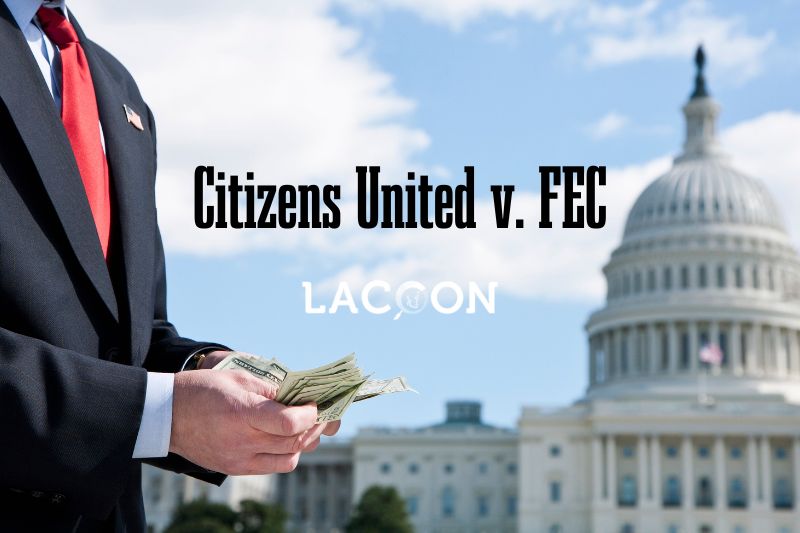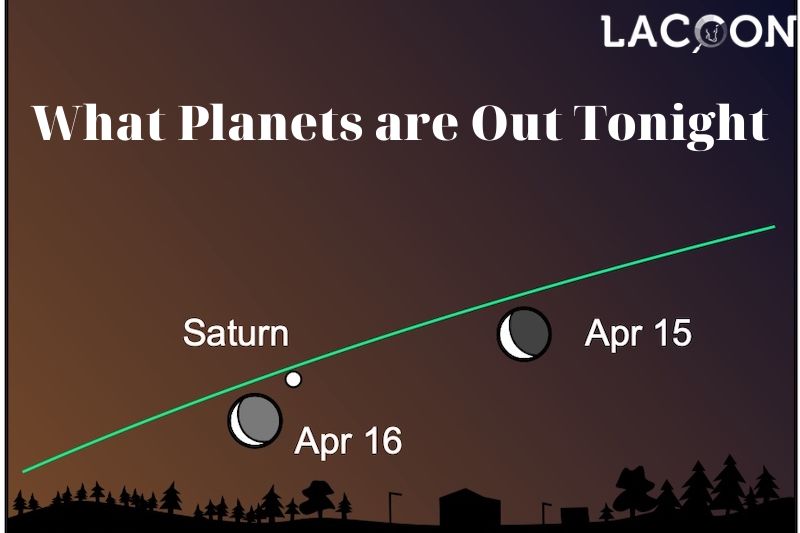The Citizens United v. Federal Election Commission (FEC) case is a landmark Supreme Court decision that has had significant and lasting effects on campaign finance law in the United States.
The 2010 ruling in favor of the conservative non-profit organization, Citizens United, struck down restrictions on corporate and union spending in elections, granting them First Amendment free speech rights. But who won Citizens United v. FEC?
Lacoon will delve into the background, the Supreme Court decision, the District Court complaint, and the relief and preliminary injunction decisions surrounding this case in this article.
Background

In order to understand the Citizens United v. FEC case, it is important to examine the historical context that led to the dispute.
The issue of money in politics and campaign finance reform has been a contentious one in the United States for decades.
The Federal Election Campaign Act (FECA) of 1971 sought to address this issue by setting limits on contributions and expenditures by individuals, political parties, and political action committees (PACs).
In 2002, the Bipartisan Campaign Reform Act (BCRA), also known as the McCain-Feingold Act, further sought to regulate campaign finance by prohibiting corporations and labor unions from using their general treasury funds.
It makes independent expenditures for electioneering communications or for speech that expressly advocates the election or defeat of a candidate.
In 2008, Citizens United, a conservative non-profit organization, produced a 90-minute documentary film titled “Hillary: The Movie,” which was critical of then-Senator Hillary Clinton, who was running for the Democratic nomination for President.
Citizens United sought to distribute the film through video-on-demand services and to promote it with television advertisements.
However, doing so would have violated the BCRA’s restrictions on corporate-funded electioneering communications within 30 days of a primary election or 60 days of a general election.
Consequently, Citizens United filed a lawsuit against the FEC, challenging the constitutionality of these provisions.
Supreme Court Decision – Who Won Citizens United v. FEC?

On January 21, 2010, in a 5-4 decision, the Supreme Court ruled in favor of Citizens United, striking down the BCRA’s restrictions on corporate and union spending in elections.
Writing for the majority, Justice Anthony Kennedy argued that the First Amendment prohibits the government from restricting independent expenditures for political communications by corporations, labor unions, and other associations.
The Court maintained that political speech is indispensable to democracy, and the government may not suppress it on the basis of the speaker’s corporate identity.
The decision effectively overturned the precedent set by two previous cases: Austin v. Michigan Chamber of Commerce (1990), which upheld restrictions on corporate spending in elections, and McConnell v. FEC (2003), which upheld the constitutionality of the BCRA.
The dissenting opinion, written by Justice John Paul Stevens, argued that the majority’s ruling undermined the integrity of elected institutions and allowed for the potentially corrupting influence of large amounts of money in politics.
District Court Complaint
Citizens United filed its original complaint in the U.S. District Court for the District of Columbia in December 2007.
The organization argued that the BCRA’s restrictions on corporate electioneering communications were unconstitutional and that the FEC’s regulations implementing those restrictions were also unconstitutional.
Additionally, Citizens United claimed that the FEC’s requirement for the organization to disclose its donors and the amount of its expenditures violated its First Amendment rights.
The District Court initially ruled in favor of the FEC, prompting Citizens United to appeal the decision to the Supreme Court.
Relief
In the aftermath of the Supreme Court’s decision in Citizens United v. FEC, the Court granted relief to the plaintiff by declaring that the BCRA’s restrictions on corporate and union spending in elections were unconstitutional.
This decision provided relief not only to Citizens United but also to other organizations, corporations, and labor unions, which were now free to make independent expenditures to support or oppose candidates in elections.
In addition to striking down the restrictions, the Court also upheld the disclosure requirements of the BCRA, ruling that the government had a legitimate interest in providing the electorate with information about the sources of election-related spending.
Preliminary Injunction Decision

Prior to the Supreme Court’s decision, Citizens United had sought a preliminary injunction to prevent the FEC from enforcing the BCRA’s restrictions on the film “Hillary: The Movie” and its accompanying advertisements.
However, the District Court denied the injunction, stating that Citizens United was unlikely to succeed on the merits of its arguments.
Following the Supreme Court’s ruling, the preliminary injunction became moot, as the restrictions on corporate and union spending in elections were deemed unconstitutional.
Impact and Ongoing Debate
The Citizens United v. FEC decision has had far-reaching consequences on campaign finance in the United States.
By equating corporate spending in elections with free speech, the Court effectively opened the door for corporations, unions, and other organizations to spend unlimited amounts on independent expenditures in support of or against political candidates.
This ruling led to the rise of super PACs, which can raise and spend unlimited funds from individuals, corporations, and unions, as long as they do not coordinate directly with candidates or political parties.
Critics of the decision argue that it has allowed for the potential corrupting influence of money in politics, as well as the erosion of the principle of “one person, one vote.”
They contend that the influx of money from wealthy individuals and corporations has drowned out the voices of average citizens and shifted the balance of power in the political process.
Proponents, on the other hand, maintain that the ruling is a victory for free speech and that the government should not be in the business of regulating political speech.
Conclusion
The debate surrounding the Citizens United v. FEC decision continues to be a focal point in discussions of campaign finance reform, and various efforts have been made to mitigate its effects or overturn the ruling altogether.
Some states have attempted to enact public financing programs to counter the influence of money in politics, while others have called for a constitutional amendment to overturn the decision.
As the debate continues, the legacy of Citizens United v. FEC remains a contentious and significant element of American political discourse.




